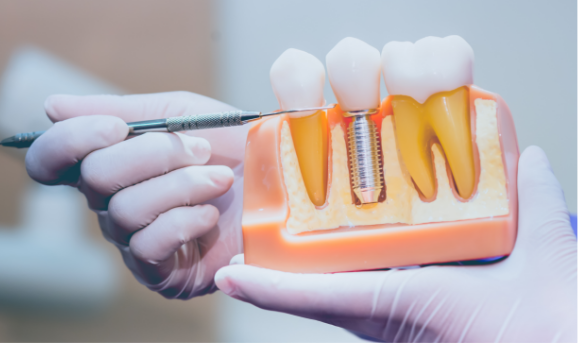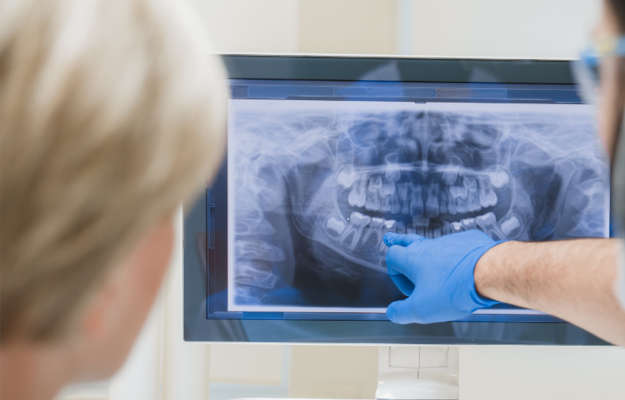Peri-Implantitis Treatment in Phoenix, AZ
Peri-Implantitis: What You Need To Know
Peri-implantitis is a condition that affects patients who have had dental implant procedures. It starts as a bacteria that forms in the gums around the implant. In many ways, it is similar to gum disease in that it causes damage to the gums and teeth around it. Getting dental implants does not mean that you are going to get peri-implantitis. It is avoidable and easily treatable if caught quickly.
Peri-Implantitis Treatment Options
At Arizona Periodontal Group our immediate priority is to prevent bacterial infections from occurring. However, when patients come to us with advanced cases, our long-term goal is to stop the progression of bone loss and keep their implants in place.
LAPIP Treatment
LAPIP is an effective method to kill unhealthy bacteria and tissue while leaving healthy tissue untouched. LAPIP stands for Laser-Assisted Perio-Implantitis Protocol. It uses the same laser for LANAP® (Laser-Assisted New Attachment Procedure). The main difference is that LAPIP treats gum disease around dental implants while LANAP® treats gum disease around natural teeth. LAPIP and LANAP® use a very specialized laser small enough to fit between the implant (or tooth) and the gums. The laser is effective in distinguishing the difference between good and bad bacteria. The main benefit of LAPIP and LANAP® is that there is no cutting or sutures, and recovery is quicker with less discomfort.

Antibiotics
In addition to thorough cleaning of the infected area with lasers or other dental tools, antibiotics help to kill off the remaining unhealthy bacteria within your gums and bone. Antibiotics may also be applied directly to the implant itself as well.
Surgery
Most severe cases of peri-implantitis require the removal of the implant and bone grafting to replace the damaged bone. To do this, your gums will need to be opened and the infection fully detoxified. Before new bone can be grafted onto the implant, your Periodontist must be confident that all of the infection can be eliminated. Most often this means strong antibiotics.
The type of bone that is used and its physiology are critical, but there are no guarantees of success. There are many variables that contribute to a graftings success or failure. Having a team of specialists from Dental Partners of Boston on your side who lead the industry in advanced procedures, techniques and methods can significantly improve your chances of success.
Don’t Put Off Treatment
In the early stages of Peri-Implantitis, the symptoms are relatively mild. Most experience swollen gums, leading to tenderness and sensitivity in the mouth. The longer the infection goes untreated, however, the more serious the symptoms become. Ultimately, dental implants can fail and bone structure can become damaged.
It is crucial to have an experienced and detail-oriented Periodontist perform your dental implant procedures from start to finish. At Arizona Periodontal Group, we go to great lengths to minimize bacterial exposure during procedures. Our definition of success is not just having you walk out of our office with a great smile, but being happy with that smile for years to come.

Knowledge Is Power
Understanding and recognizing this bacterial infection is the first step to ensuring it does not affect you.
While it is rare for our patients to experience post-op infections, a variety of circumstances can introduce harmful bacteria into the gums around dental implants. Knowing what to watch out for and scheduling a consultation as soon as you notice any of these symptoms will significantly improve your chances of healthy recovery and continued wellness.
Signs and Symptoms
- Inflammation causes redness, swelling, and pain of the gum tissue around the implants.
- Receding gum line. The “pocket” of gum that the implant has been placed into grows bigger and deeper.
- Exposure or visibility of the implant threads.
- Loosening of the implant.
- Pus discharge from within the gums around the implant. It may be a very unpleasant taste rather than something you see.
- Bone deterioration is usually unseen but painful. Often felt as soreness in the jaw.
- Bleeding occurs when the gums are infected. There are no situations where bleeding gums are healthy or to be expected.
- Swollen or tender lymph nodes around the neck or armpits.
If you feel that your daily life is being affected by pain or discomfort around your dental implants, call us immediately to schedule an appointment. Pain or sensitivity while chewing, drinking, exercising, moving your head into different positions, headaches, soreness or stiffness in the jaw is not healthy and indicates a problem and needs to be looked at by our Periodontist as soon as possible.
It is important to remember that while these more severe symptoms are real risks, they only happen when peri-implantitis is left untreated for significant amounts of time. When caught early and provided adequate supervision from a competent periodontist, peri-implantitis can be treated before it ever causes undue discomfort or embarrassment.
How Does Peri-Implantitis Begin?
The primary sources of peri-implantitis are:
1. Compromised Immune System
Patients affected by a disease that affects the whole body are at a higher risk of peri-implantitis. If you have diabetes or another systemic illness, consult with your dentist about dental implants. At Dental Partners of Boston, we understand how these diseases affect peri-implantitis, and we can adjust our treatment accordingly. Additionally, if patients have ever had a different type of mouth infection similar to peri-implantitis – they may be at a higher risk. Bring it to your dentist’s attention if you have ever contracted periodontitis extensive gum disease or other bacterial mouth infections.
2. Insufficient Dental Care
Peri-implantitis is caused primarily by the bacteria and food particles that gradually accumulate around dental implants and gum lines. Careful and consistent dental care is needed in order to minimize and eliminate harmful pathogens, which are found in plaque and tartar. As with most other dental conditions, peri-implantitis can be made worse by smoking, alcohol and drug use. Consult your Periodontist for more information on how to adopt healthy dental habits.
3. Parafunctional Habits
These are involuntary habits you may have. They can be due to malformation of part of your body or a nervous tick. They can even occur unconsciously during sleep. Habits like grinding your teeth in your sleep, poorly positioning your teeth when your jaw is closed, nail-biting and others.
If you think you might be experiencing peri-implantitis, schedule an appointment today with Dr. Trujillo at Phoenix Periodontal Group.
We look forward to seeing you.
Peri-Implantitis Treatment in Phoenix, AZ
1717 W. Northern Ave., Suite 104, Phoenix, AZ 85021
Se Habla Español




